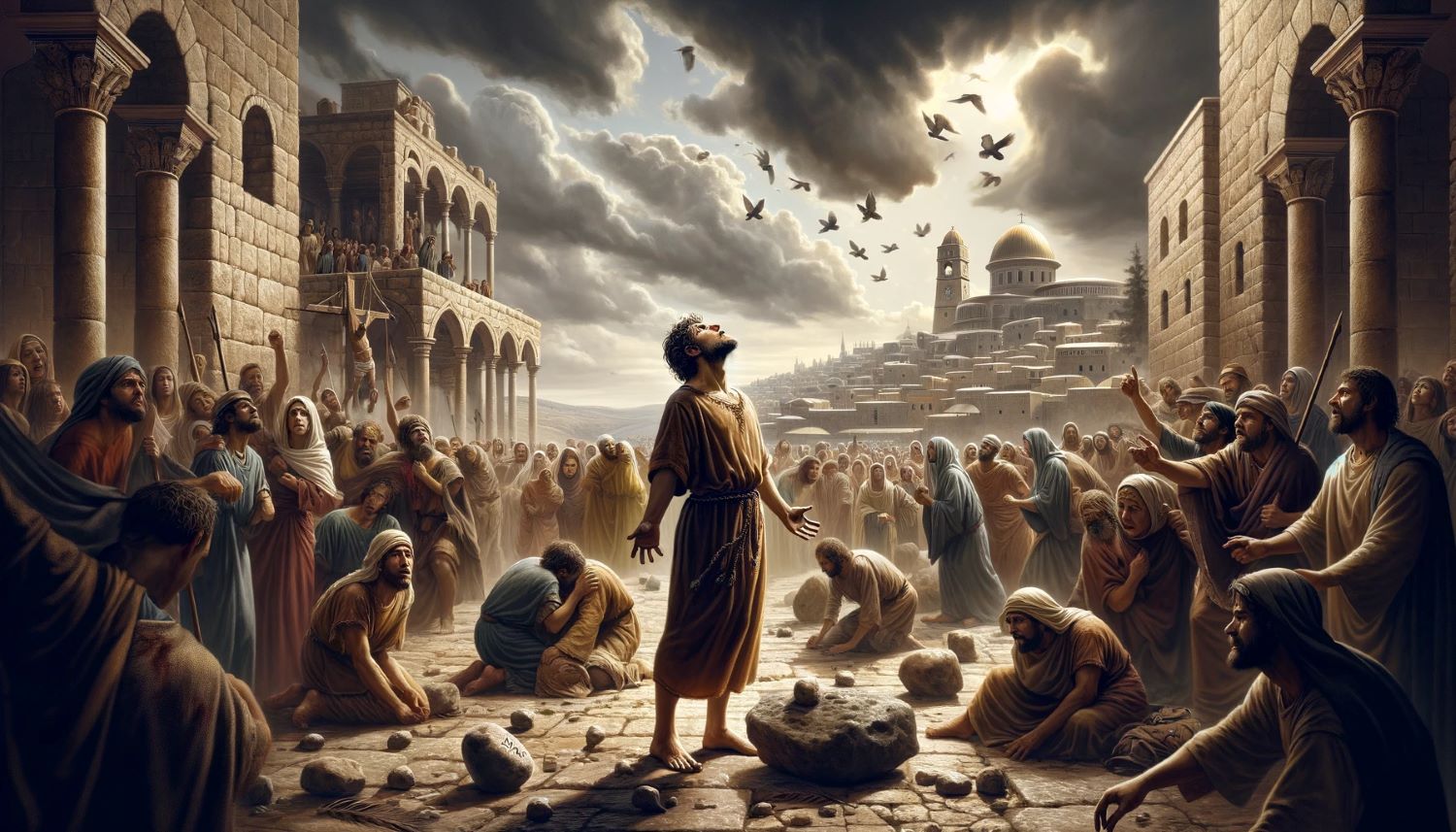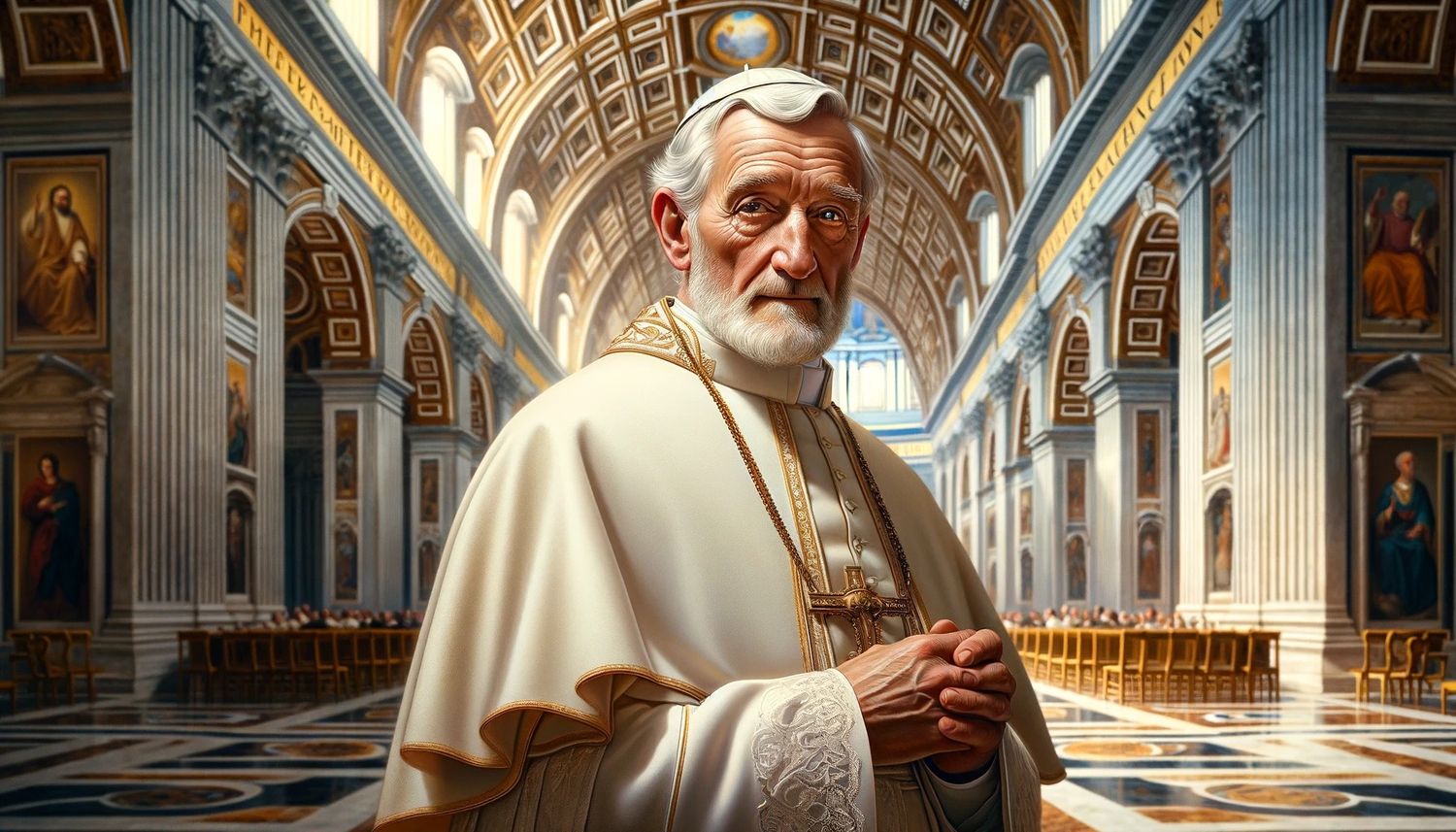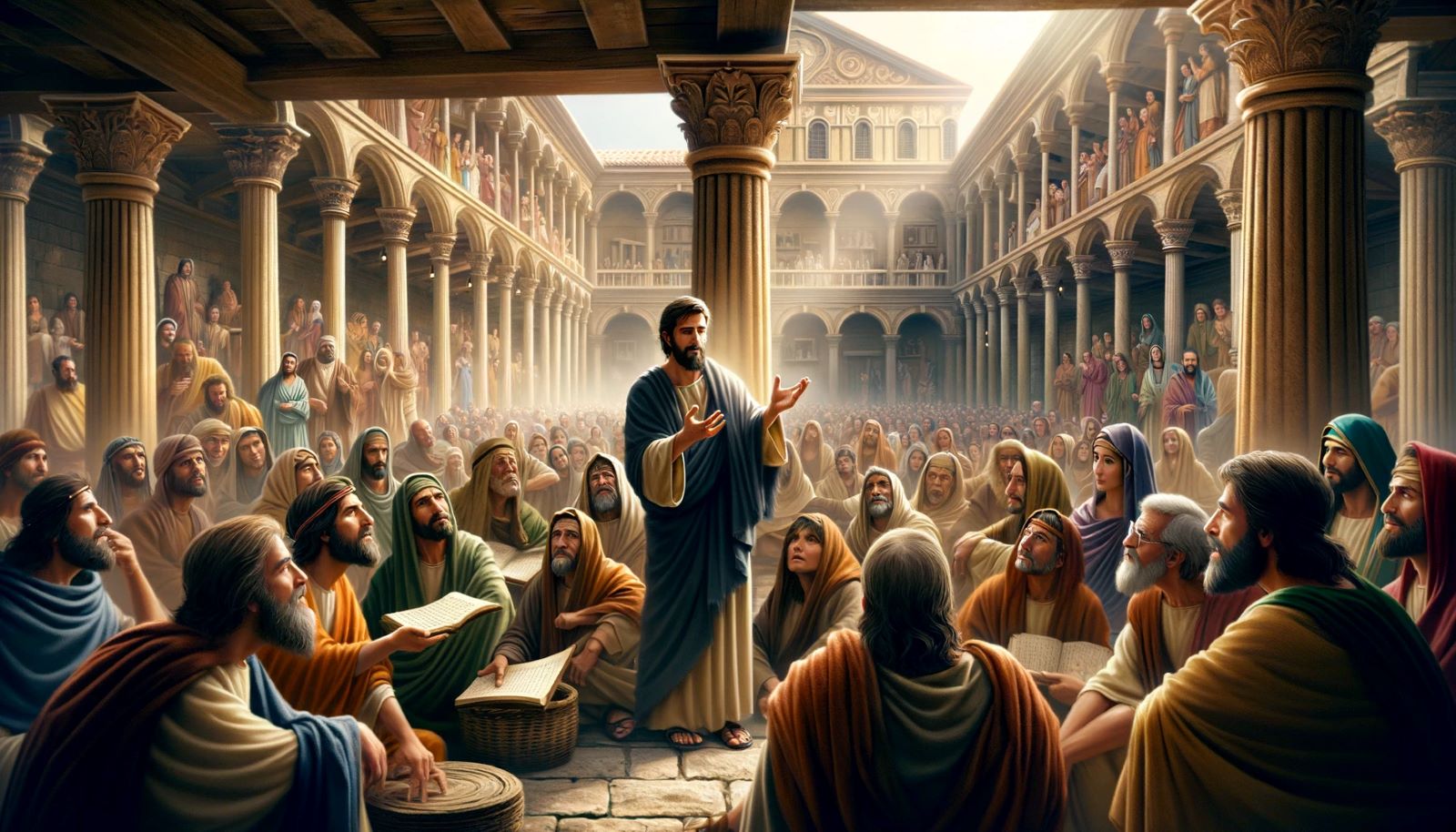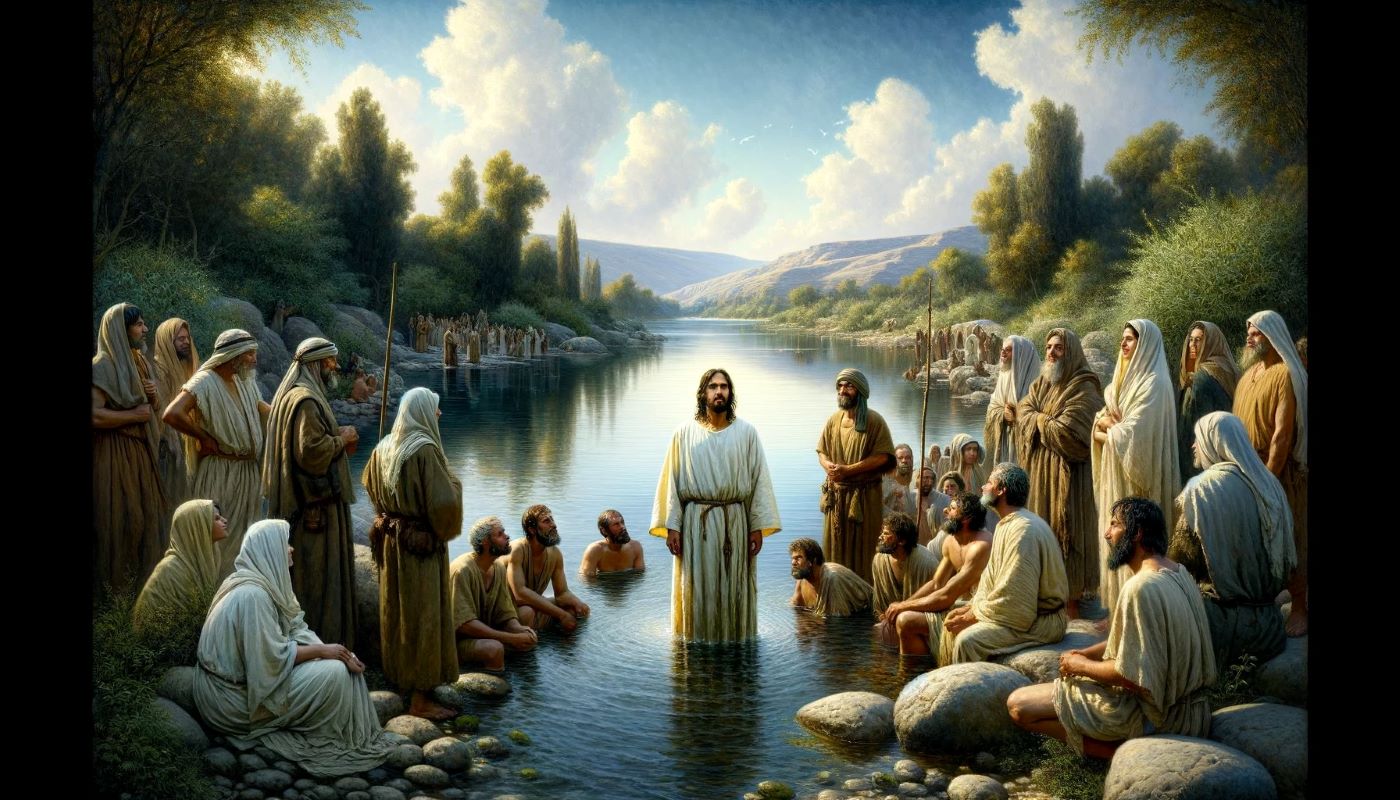Home>Bible Facts>Who Was The Leader Of The Apostles And The First Pope
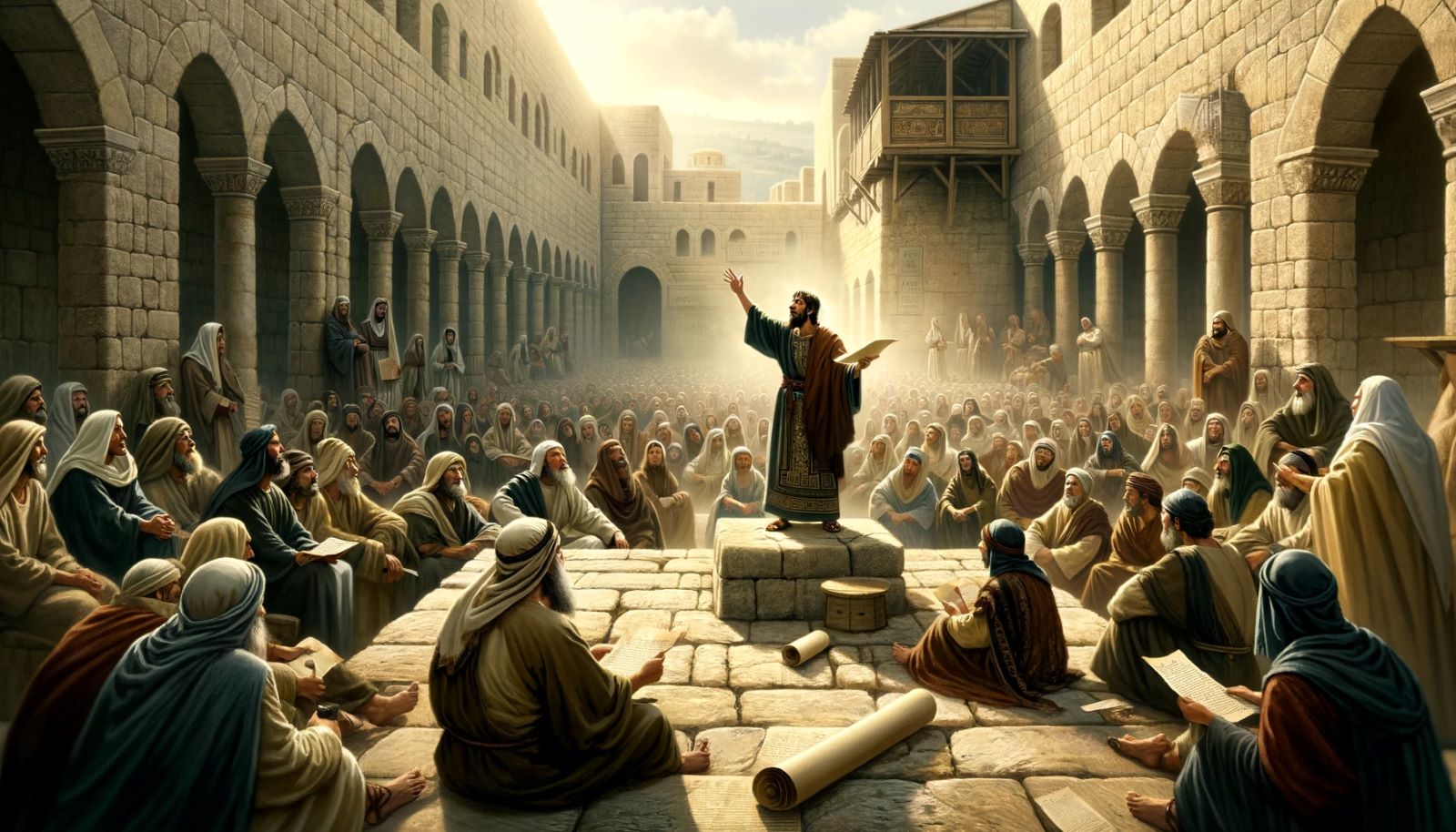

Bible Facts
Who Was The Leader Of The Apostles And The First Pope
Published: February 17, 2024
Ericka Andersen, an editor at Christian.net, expertly merges digital strategy with content creation, focusing on faith and societal issues. Her communication skills enhance the platform's engaging narratives, fostering meaningful dialogue on belief's impact on society.
Discover the truth about the first pope and leader of the apostles. Explore fascinating Bible facts and uncover the history of this influential figure.
(Many of the links in this article redirect to a specific reviewed product. Your purchase of these products through affiliate links helps to generate commission for Christian.net, at no extra cost. Learn more)
Table of Contents
Introduction
The apostles played a pivotal role in the establishment and spread of Christianity. These twelve individuals were chosen by Jesus Christ himself and were entrusted with the responsibility of carrying forth his teachings to the world. Among the apostles, one figure stands out as a prominent leader and key influencer in the early Christian church – Simon Peter.
Peter's leadership and influence extended beyond the initial group of apostles, and he is widely regarded as the first pope in the Catholic Church. His significance in shaping the early Christian community and his enduring legacy continue to be revered by millions of believers worldwide.
In this article, we will delve into the leadership of the apostles, with a particular focus on Peter's pivotal role and his subsequent position as the first pope. By exploring the historical and religious significance of Peter's leadership, we can gain a deeper understanding of the foundational principles of the Christian faith and the enduring impact of the apostolic era.
Read more: Who Was The Leader Of The Apostles
The Role of the Apostles in Christianity
The apostles held a central and indispensable role in the establishment and propagation of Christianity following the crucifixion and resurrection of Jesus Christ. Chosen by Jesus himself, the twelve apostles were entrusted with the profound responsibility of disseminating his teachings and laying the foundation for the Christian faith. Their collective mission was to spread the message of salvation, forgiveness, and redemption to all corners of the world.
The apostles served as the primary conduits through which the transformative message of Jesus Christ was conveyed to diverse communities and cultures. They were instrumental in nurturing and expanding the early Christian church, guiding new believers, and establishing congregations. Their unwavering commitment to sharing the gospel and their willingness to endure persecution and hardship exemplified their dedication to fulfilling the divine mandate bestowed upon them.
Furthermore, the apostles played a crucial role in preserving the authenticity and integrity of Jesus' teachings. Through their firsthand experiences and interactions with Jesus, they were able to impart invaluable insights into his life, ministry, and profound spiritual truths. Their testimonies and accounts formed the basis of the New Testament, providing a comprehensive record of Jesus' life, teachings, and the establishment of the early Christian community.
In addition to their missionary endeavors, the apostles were entrusted with the responsibility of shepherding and guiding the burgeoning Christian congregations. They provided spiritual leadership, imparted doctrinal instruction, and offered pastoral care to the believers under their charge. Their collective wisdom and spiritual authority served to unify and strengthen the early Christian communities, fostering a sense of belonging and shared purpose among the believers.
The apostles' unwavering commitment to their mission, coupled with their resilience in the face of adversity, laid the groundwork for the enduring legacy of Christianity. Their contributions, sacrifices, and steadfast devotion to spreading the gospel continue to inspire and resonate with believers across the globe, underscoring the profound impact of their role in shaping the Christian faith.
In summary, the apostles played a pivotal role in the inception and proliferation of Christianity, serving as ambassadors of Jesus Christ and stewards of his teachings. Their collective efforts and enduring legacy have left an indelible mark on the Christian faith, embodying the transformative power of unwavering faith, resilience, and the enduring impact of a dedicated few who were called to carry forth the message of hope and salvation to the world.
The Leadership of Peter
Peter, also known as Simon Peter, emerged as a prominent and influential figure among the apostles, demonstrating exceptional leadership qualities and unwavering devotion to Jesus Christ. His leadership was characterized by courage, resilience, and a deep sense of conviction, which earned him the respect and admiration of his fellow apostles and early Christian communities.
One of the defining aspects of Peter's leadership was his unwavering faith and steadfast commitment to Jesus Christ. Despite moments of doubt and human frailty, Peter's profound belief in the divinity of Jesus and his teachings served as a guiding light for the early Christian community. His unwavering faith was exemplified during pivotal moments, such as when he walked on water to meet Jesus and when he boldly professed Jesus as the Messiah, earning him the appellation "the rock" upon which the church would be built.
Peter's leadership was also marked by his willingness to embrace challenges and confront adversity with resilience and determination. His role as a fisherman prior to being called by Jesus underscored his humble origins, yet he transitioned into a steadfast and resolute leader who fearlessly faced opposition and persecution for the sake of the gospel. His steadfastness in the face of adversity served as an inspiration to his fellow apostles and the early Christian believers, instilling in them the courage to persevere in the face of hardship and opposition.
Furthermore, Peter's leadership was characterized by his role as a unifying force within the apostolic circle. Despite occasional disagreements and differences of opinion among the apostles, Peter's ability to foster unity and resolve conflicts contributed to the cohesion and solidarity of the early Christian community. His leadership style emphasized collaboration, mutual respect, and a shared commitment to advancing the gospel message, thereby fostering a sense of camaraderie and purpose among the apostles.
Peter's leadership extended beyond his interactions with the apostles, as he played a pivotal role in guiding and shepherding the early Christian congregations. His pastoral care and unwavering dedication to nurturing the spiritual growth of believers exemplified his profound sense of responsibility as a leader within the burgeoning Christian community. His teachings and guidance provided a firm foundation for the fledgling congregations, instilling in them a sense of spiritual fortitude and doctrinal clarity.
In summary, Peter's leadership within the apostolic circle was characterized by unwavering faith, resilience in the face of adversity, a unifying presence, and a steadfast commitment to shepherding the early Christian communities. His exemplary leadership laid the groundwork for the enduring influence he would exert within the Christian faith, culminating in his pivotal role as the first pope and the enduring legacy he left for future generations of believers.
Peter's Role as the First Pope
Peter's pivotal role as the first pope holds profound significance within the Catholic Church and the broader Christian tradition. The title "pope" is derived from the Latin word "papa," meaning "father," reflecting the spiritual fatherhood and leadership role ascribed to the Bishop of Rome, who is recognized as the successor of Peter.
The foundation of Peter's role as the first pope can be traced to a pivotal moment in the New Testament, where Jesus bestows upon Peter the symbolic keys to the kingdom of heaven, signifying his authority and leadership within the nascent Christian community. In the Gospel of Matthew, Jesus declares to Peter, "And I tell you, you are Peter, and on this rock, I will build my church, and the gates of Hades will not prevail against it. I will give you the keys of the kingdom of heaven, and whatever you bind on earth will be bound in heaven, and whatever you loose on earth will be loosed in heaven" (Matthew 16:18-19, NRSV).
This profound declaration by Jesus is widely interpreted within the Catholic tradition as the establishment of Peter's primacy and leadership among the apostles, with the authority to guide and shepherd the early Christian community. The symbolic imagery of the keys and the rock solidified Peter's foundational role in shaping the future trajectory of the Christian church.
Following Jesus' resurrection and ascension, Peter emerged as a central figure in the early Christian community, exercising his leadership and authority in guiding the believers and addressing critical doctrinal and pastoral matters. His influential role in the Council of Jerusalem, as depicted in the Book of Acts, exemplifies his leadership in resolving significant theological and practical issues, underscoring his position as a spiritual authority and discerning leader within the apostolic circle.
The enduring legacy of Peter's leadership culminated in his association with the city of Rome, where he is traditionally believed to have served as the first bishop. This historical connection to Rome, coupled with the foundational belief in Peter's primacy among the apostles, laid the groundwork for the establishment of the papal office and the recognition of the Bishop of Rome as the successor of Peter.
The institution of the papacy, with Peter as its inaugural figure, has played a pivotal role in providing spiritual guidance, doctrinal continuity, and pastoral leadership within the Catholic Church. The pope, as the successor of Peter, is regarded as the visible head of the church, entrusted with the responsibility of preserving the apostolic tradition, fostering unity among believers, and proclaiming the gospel message to the world.
In essence, Peter's role as the first pope symbolizes the continuity of leadership and spiritual authority within the Catholic Church, rooted in the foundational teachings and legacy of the apostolic era. His enduring influence as the rock upon which the church was built continues to resonate within the hearts and minds of believers, underscoring the profound impact of his leadership and the enduring legacy he left for future generations of Christians.
The Legacy of Peter in the Catholic Church
Peter's legacy within the Catholic Church is deeply rooted in his foundational role as the first pope and his enduring influence on the development of the church's doctrine, tradition, and spiritual leadership. His profound impact continues to resonate within the fabric of the Catholic faith, shaping its identity and providing a timeless example of unwavering faith and steadfast commitment to the teachings of Jesus Christ.
One of the most enduring aspects of Peter's legacy is his unwavering faith and steadfast commitment to Jesus Christ, which serves as a guiding light for Catholics worldwide. His profound belief in the divinity of Jesus and his teachings exemplifies the essence of Christian faith, inspiring believers to embrace a similar depth of conviction and dedication to their spiritual journey. Peter's unwavering faith, despite moments of human frailty, serves as a poignant reminder of the transformative power of steadfast devotion to Christ.
Furthermore, Peter's legacy is intricately intertwined with the papal office, which he is traditionally regarded as inaugurating. The continuity of the papacy, with the Bishop of Rome as the successor of Peter, underscores the enduring impact of his leadership and spiritual authority within the Catholic Church. The papacy serves as a visible symbol of unity, doctrinal continuity, and pastoral guidance, reflecting Peter's foundational role in providing steadfast leadership and spiritual direction to the early Christian community.
Peter's legacy also extends to his profound influence on the development of Christian doctrine and theology. His teachings and writings, preserved in the New Testament, continue to serve as a source of spiritual nourishment and doctrinal guidance for Catholics. His insights into the nature of Christ, the significance of faith, and the call to holiness have left an indelible mark on the theological framework of the Catholic Church, shaping its understanding of core Christian principles and moral teachings.
Moreover, Peter's legacy is embodied in the enduring traditions and rituals of the Catholic Church, many of which trace their origins to the apostolic era. The sacrament of confession, the celebration of the Eucharist, and the veneration of saints are among the rich traditions that reflect Peter's foundational influence on the spiritual practices and liturgical life of the Catholic faithful. These traditions serve as a living testament to the enduring legacy of Peter and the apostolic foundation upon which the Catholic Church is built.
In essence, Peter's legacy in the Catholic Church encompasses his unwavering faith, his foundational role in establishing the papal office, his enduring influence on Christian doctrine, and his contributions to the rich tapestry of Catholic traditions. His legacy continues to inspire and guide believers, serving as a timeless testament to the transformative power of faith and the enduring impact of a humble fisherman who became the rock upon which the church was built.
Read more: Who Is The Leader Of The 12 Apostles
Conclusion
In conclusion, the leadership of the apostles, particularly the pivotal role of Simon Peter, holds profound significance in the historical and theological narrative of Christianity. The apostles, chosen by Jesus Christ himself, served as the vanguards of the Christian faith, carrying forth the transformative message of salvation and redemption to diverse communities. Their unwavering commitment, resilience in the face of adversity, and enduring legacy continue to inspire and resonate with believers across the globe, underscoring the profound impact of their role in shaping the Christian faith.
Simon Peter, in particular, emerged as a central figure among the apostles, demonstrating exceptional leadership qualities and unwavering devotion to Jesus Christ. His unwavering faith, resilience in the face of adversity, and role as a unifying force within the apostolic circle exemplified his profound influence on the early Christian community. His leadership extended beyond the apostolic circle, as he played a pivotal role in guiding and shepherding the early Christian congregations, providing spiritual leadership and doctrinal clarity.
Peter's subsequent role as the first pope in the Catholic Church further solidifies his enduring legacy. The symbolic imagery of the keys to the kingdom of heaven, as bestowed upon Peter by Jesus, signifies his authority and leadership within the nascent Christian community. His association with the city of Rome and his foundational role in establishing the papal office underscore the enduring impact of his leadership and spiritual authority within the Catholic Church.
The legacy of Peter within the Catholic Church encompasses his unwavering faith, his foundational role in establishing the papal office, his enduring influence on Christian doctrine, and his contributions to the rich tapestry of Catholic traditions. His legacy continues to inspire and guide believers, serving as a timeless testament to the transformative power of faith and the enduring impact of a humble fisherman who became the rock upon which the church was built.
In essence, the leadership of the apostles, epitomized by the influential role of Simon Peter, stands as a testament to the enduring impact of unwavering faith, steadfast commitment to the teachings of Jesus Christ, and the transformative power of a dedicated few who were called to carry forth the message of hope and salvation to the world. Their collective legacy continues to resonate within the hearts and minds of believers, shaping the foundational principles of the Christian faith and providing a timeless example of steadfast devotion and unwavering leadership.
